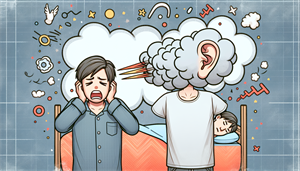Want to avoid snoring on your next plane ride? Snoring not only disrupts your sleep quality but also those around you. Discover immediate, practical tips on how to not snore on a plane, from choosing the right seat to quick in-flight adjustments. Our straightforward guide provides the strategies you need for a quiet journey.
Key Takeaways
-
Reclined seating positions, changes in cabin air pressure and humidity, and cabin noise can exacerbate snoring on airplanes due to increased soft tissue vibration and potential congestion.
-
Pre-flight strategies to minimize snoring include adjusting sleep schedules to align with destination time zones, avoiding alcohol, caffeine, and heavy meals before the flight, and considering using nasal dilators or strips to improve airflow.
-
In-flight measures to reduce snoring consist of staying hydrated, using nasal sprays to keep nasal passages moist, opting for a neck pillow to maintain proper sleep position, practicing mindfulness and breathing techniques for relaxation, and consulting with a sleep medicine specialist for chronic snoring issues.
Understanding Snoring Dynamics in Airplane Cabins

Ever wondered why you or your fellow passengers might snore more on a plane than in your bed at home? Well, a number of factors contribute to this phenomenon. One of the primary culprits for increased snoring on an airplane is the seating position. While most of us would love to stretch out in a flat bed, the reality is that the majority of us end up in an upright or semi-upright position for the duration of the flight. This reclined position, combined with the vibrations from the airplane engines, can cause the soft tissues in our airway to vibrate more, leading to that all-too-familiar snoring sound.
Besides the seating position, the likelihood of snoring can also increase due to changes in cabin air pressure and reduced humidity levels. These factors can cause nasal congestion or dryness, leading to an increase in the vibration of airway tissue and subsequently, snoring.
Cabin noise, especially from the engine, can disrupt sleep, potentially escalating snoring for those who manage to sleep and snore loudly.
Identify Your Snoring Triggers
Understanding your personal snoring triggers can go a long way in managing them during air travel. Certain factors like severe fatigue and allergies can trigger snoring, and it’s important to be aware of these before you board your flight. For instance, hay fever, a common allergy, can significantly affect snoring, especially during the summer months when allergies are more common.
While antihistamines are often used to alleviate allergies, research has indicated that they may not consistently provide allergy relief in the form of alleviating snoring associated with allergic reactions. In such cases, other anti-snoring appliances like nasal dilators or strips may be considered as an alternative allergy treatment. Before opting for sleeping pills, consider evaluating other alternatives such as:
-
Changing sleeping positions
-
Using a humidifier in the bedroom
-
Avoiding alcohol and sedatives before bed
-
Losing weight if overweight
-
Seeking treatment for underlying medical conditions such as sleep apnea
These alternatives may help alleviate snoring and improve quality sleep.
Pre-Flight Preparation for Snore-Free Travel
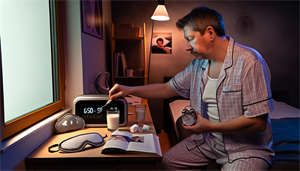
Preparing for a flight is not just about packing your bags and checking in online. For a snore-free travel experience, some pre-flight preparations can be incredibly beneficial. These can include adjusting your sleep schedule and making simple dietary changes to reduce the risk of snoring.
These aspects will be further discussed below.
Adjust Your Sleep Schedule
One effective way to reduce snoring during air travel is by gradually adjusting your sleep schedule before your flight. This can help you minimize jet lag and improve sleep quality, both of which can significantly reduce the occurrence of snoring. But how does this strategy function?
The principle behind this strategy is based on optimizing your circadian rhythm, which is your body’s internal clock that regulates your sleep-wake cycle. By adjusting your bedtime to one hour later for several nights before your flight, you can reduce the impact of jet lag and potentially decrease your chances of snoring. Additionally, trying to sleep upright during the flight can further help in minimizing discomfort.
As a bonus, this method can also help you feel more refreshed and alert upon arrival at your destination.
Dietary Considerations
Another key aspect of pre-flight preparation involves making dietary adjustments. Consuming certain types of food and beverages before a flight can increase the likelihood of snoring. For instance, alcohol, caffeine, and heavy meals can disrupt your sleep and increase the chances of snoring.
Alcohol, in particular, can result in increased awakenings, decreased sleep quality, and reduced deep sleep. On the other hand, caffeine can disrupt your circadian rhythm, making it harder for you to fall asleep. Avoiding these substances before your flight can help ensure a peaceful, snore-free journey for you and your neighboring passengers.
In-Flight Strategies to Quiet Snores
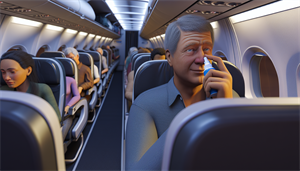
Once you’re on the plane, there are several strategies you can employ to minimize snoring. The importance of staying hydrated and using nasal sprays to alleviate congestion will be discussed below.
Stay Hydrated
Staying hydrated is crucial in preventing snoring on an airplane as it contributes to the upkeep of healthy mucous membranes in the nose and throat. This helps decrease the chances of irritation and congestion that can cause snoring. The low humidity in cabin air can lead to dehydration, which increases the difficulty in breathing without snoring.
To prevent snoring on an airplane, make sure to:
-
Drink water before and during the flight to stay hydrated
-
Avoid excessive alcohol and caffeine, as they can contribute to dehydration
-
Use a saline nasal spray to keep your nasal passages moisturized
-
Consider using a nasal strip or nasal dilator to help keep your airways open
By following these tips, you can reduce the likelihood of snoring and have a more comfortable flight.
You might be wondering, how much water should you drink? While there’s no one-size-fits-all answer, consuming an adequate amount of water both before and during the flight can help maintain moist airways, which can reduce snoring. Plus, if you’re flying long-haul, you can consider utilizing a humidifier which can introduce moisture into the dry cabin air, decreasing dryness in the nasal passages and throat.
Utilize Nasal Sprays
Another effective in-flight strategy to quiet snores is the use of nasal sprays. Nasal sprays can reduce snoring by clearing the nasal passages and reducing inflammation. Saline nasal sprays, in particular, can alleviate dryness resulting from low humidity in airplanes, helping maintain clear nasal passages and decreasing the likelihood of snoring due to congestion.
But before you reach for that nasal spray, it’s crucial to be aware of potential side effects, such as:
-
nasal irritation
-
redness
-
burning
-
stinging
Avoiding prolonged use without appropriate medical supervision is also important. So, always check with a healthcare professional before using a nasal spray for snoring.
Anti-Snoring Gear for High Altitude Slumber
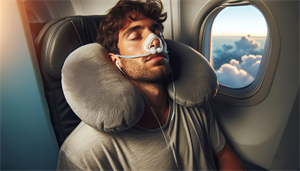
If you’re looking for solutions to further help you avoid snoring on a plane, consider exploring some anti-snoring gear options. From nasal dilators and strips to neck pillows, there are a variety of options available that can help you enjoy a peaceful slumber on a plane.
These will be further discussed below.
Nasal Dilators and Strips
Nasal dilators and strips serve the purpose of mechanically expanding the nasal passages to decrease nasal congestion and enhance breathing, potentially providing relief from snoring. By physically opening the nasal passages, they improve airflow and decrease the likelihood of snoring.
There are several brands in the market that offer these products, such as Breathe Right Extra Strength Clear Nasal Strips and Sunset Hush Strips. However, be mindful of potential side effects such as skin reactions or mild irritation due to the adhesive used in these products.
Neck Pillow Support
Neck pillows are another option that can provide proper support and maintain an optimal sleep position to prevent snoring. A good neck pillow should provide adequate support for the head, neck, and shoulders, maintaining proper alignment to help prevent snoring.
Neck pillows, used alone or in conjunction with other anti-snoring equipment, can yield improved results. Note that the pillow’s material can influence snoring, with pillows designed for cervical support linked to a reduction in snoring.
Optimal Sleeping Positions to Prevent Snoring
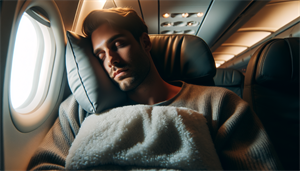
Did you know that the way you sleep can influence your snoring? Certain sleeping positions can potentially aid in reducing snoring by decreasing upper airway collapsibility and increasing the upper airway area. For instance, sleeping on your side or with slight elevation can have a positive impact in reducing snoring, as sleeping on your back can lead to snoring and potentially sleep apnea.
On an airplane, the most effective position to sleep in to minimize snoring is to lean slightly back or against the window frame, as it can help keep the airways open for easier breathing. Effective strategies for preventing snoring on a plane include sitting upright and slightly on your side, avoiding tobacco and alcohol, and staying hydrated.
Mindfulness and Breathing Techniques for Relaxation
Incorporating mindfulness and breathing techniques during your flight can be a game-changer in reducing snoring. Mindfulness meditation can have a significant positive impact on sleep quality during air travel, as it helps to induce a relaxed state that is conducive to restful sleep and reduces disturbances such as snoring.
Breathing techniques, including the 4-7-8 method, nasal inhalation, and mouth exhalation, have the potential to induce relaxation and decrease the occurrence of snoring. Mindfulness techniques, which mitigate stress and excessive thinking, reduce emotional reactivity, foster a more objective approach to sleep, and refine breath control, can help reduce snoring.
The Role of Sleep Medicine Specialists
For those who experience chronic snoring issues, consulting with a sleep medicine specialist can be highly beneficial. These professionals are trained to diagnose, treat, and study sleep disorders and can prescribe therapies such as medications and medical devices to help manage snoring.
A diagnosis of snoring may involve a sleep study, particularly in cases of severity or when accompanied by other symptoms, to assess whether it may be indicative of sleep apnea, a condition characterized by repeated pauses in breathing during sleep. Depending on the diagnosis, a sleep medicine specialist may prescribe treatment options including continuous positive airway pressure (CPAP) therapy, oral appliances, and lifestyle changes to manage snoring.
Post-Flight Recovery and Maintaining Healthy Sleep Habits
Remember, your journey to snore-free sleep doesn’t end after your flight. Post-flight recovery and maintaining healthy sleep habits are key to reducing snoring in the long term. Here are some activities to help you adjust your sleep schedule after a flight and prevent snoring:
-
Walking, standing, and gentle stretching during the flight
-
Sitting upright and slightly on your side while sleeping on the plane
-
Avoiding tobacco and alcohol
-
Staying hydrated
These activities will help you maintain healthy sleep habits and reduce snoring.
Jet lag can exacerbate snoring due to fragmented sleep and increased daytime sleepiness. Adjusting your sleep schedule on the plane and post-flight can help alleviate its impact on snoring. Here are some strategies to consider:
-
Alter your sleep position
-
Manage your weight
-
Abstain from alcohol before bedtime
-
Maintain good sleep hygiene
-
Ensure open nasal passages
These strategies can aid in reducing snoring and help you stop snoring.
Summary
We’ve covered a lot of ground in this blog post, from understanding the dynamics of snoring in airplane cabins, identifying personal snoring triggers, pre-flight and in-flight strategies to reduce snoring, and exploring anti-snoring gear options, to optimal sleeping positions, mindfulness and breathing techniques, the role of sleep medicine specialists, and post-flight recovery and maintaining healthy sleep habits. By implementing these strategies, you can ensure a snore-free plane journey, thus making air travel a more comfortable and enjoyable experience for you and your fellow passengers.
Frequently Asked Questions
What happens if you snore loudly on a plane?
If you snore loudly on a plane, flight attendants are trained to handle the situation with sensitivity. They may offer blankets or pillows to help reduce the noise, and in extreme cases, they may discreetly ask the snorer to adjust their position or relocate to a different seat if available.
What is the trick to stop snoring?
The trick to stop snoring involves keeping your throat clear and open at night, which can be achieved by using extra pillows or a specially designed wedge-shaped pillow. Additionally, sleeping on your side or raising the head of your bed may also help reduce snoring.
How can I reduce snoring during air travel?
To reduce snoring during air travel, identify personal triggers, make pre-flight preparations, stay hydrated, use nasal sprays, and consider anti-snoring gear like nasal dilators and neck pillows. Safe travels!
What role does a sleep medicine specialist play in addressing snoring?
A sleep medicine specialist can diagnose and treat sleep disorders, and may prescribe therapies like medications and medical devices to manage snoring. They play a crucial role in addressing snoring by providing effective treatment options for individuals.

